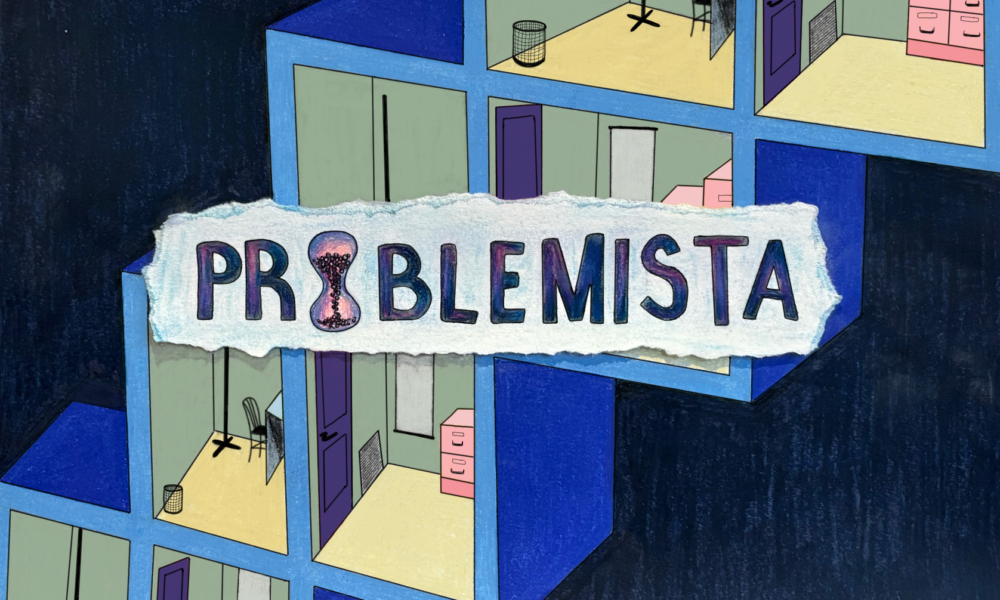Scored with futuristically unsettling synth melodies and interjecting choral staccatos, narrator and famed arthouse actress Isabella Rosellini relays the complicated and costly process of acquiring a sponsored visa in the United States in Problemista. What begins visually as a cramped, two-room equation expands into a maze-like structure of trapdoors, fluorescent lights, obscured keys, and stairs of beige file cabinets. Protagonist Alejandro (Julio Torres), or “Ale” for short, steers aimlessly through this dreamlike sequence in a desperate search, traversing through the maze of the American immigration system. He finds himself in a miserable catch-22: The system demands he pay immense fees to be allowed to work, yet he must work to acquire the necessary funds to settle these payments. As Rosellini simply states, “The maze is impossible to navigate.”
Screenwriter and director Julio Torres’s surrealist comedy Problemista, released worldwide in cinemas on March 14, poignantly explores the narratives of the contemporary American Dream through a humorous lens brimming with fantastical elements—both understated and absurd. The film was partially inspired by Torres’s experiences as an artist immigrating from El Salvador; Alejandro travels to the States in hopes of becoming a world-famous toy designer for Hasbro. In his application to the company, Alejandro monotonously details a few of his ideas, including a Barbie whose fingers are covertly crossed behind her back, creating intrigue and drama in the dreamhouse, and a snake that bungees out from its can with a sign that reads, “I’m sorry, I was trapped in this can and scaring you was the only way out.” The absurd specificity of this dialogue, though delivered lifelessly via Alejandro’s webcam video, is only a minuscule drop of this film’s unabashed hilarity.
As he waits for Hasbro’s response, Alejandro begins working in the archives of FreezeCorp, a lab caring for cryogenically frozen corpses. But Ale finds himself in a limbo between visa sponsors after being fired for presumed medical malpractice; onscreen, the grains of his metaphorical 30-day hourglass begin seeping out in the vast backrooms that stack thousands of these looming timers in their dank shelves. Eccentric art critic Elizabeth, played by the magnificently commanding Tilda Swinton, dominates the screen in every scene she’s in. She looms over everyone with her crimped and dyed red hair, avant-garde clothing choices that seemingly caricature every New York art enthusiast, and intimidating attitude and verbal assaults on everyone she encounters. Elizabeth enlists Alejandro’s help in curating a show dedicated to the legacy of her artist husband, now cryogenically frozen but once known for his beautifully tragic and emotionally transcendent egg paintings. In return, she promises to be his sponsor after the show’s success.
Alejandro soon learns how to navigate the intricacies of the contemporary art world, while simultaneously taming Elizabeth’s temper as he organizes her late husband’s show. With Elizabeth’s reluctance to sponsor him and the departure of her paid intern Bingham (James Scully), who leaves after receiving a Guggenheim grant for “being cute in the arts,” Alejandro turns to Craigslist for cash. The menacing Craigslist (Larry Owns) is a personified tentacled Ursula-inspired creature who offers jobs inspired by Torres’s actual experiences: Handing out hair salon promotions on the street or being a “cleaner” for a man who wishes to watch him.
Problemista achieves all that it sets out to, presenting pointed critiques of both the modern art world and the American immigration system. It parodies a world in which legacy is commodified and art becomes a product. While Torres’s narrative serves to highlight the injustices of the visa process, the film also embraces and celebrates the strengthening solidarity of the immigrant experience. Alejandro is only one of the many who risk their lives each year for opportunity in a new country, and this portrayal of the contemporary American Dream calls into question the term’s legitimacy in the first place. He presents his story through this absurd humour, because the world is absurd: It’s unforgiving, unjust, and arranged such that power is permanently reserved for those who already have it.
It’s incredibly rare that a film can be so simultaneously hilarious and moving. Problemista’s surrealist elements transcend comedic tradition, becoming a memorable film from its authenticity and uniqueness.
Problemista is now playing in select theatres.








